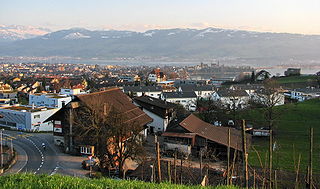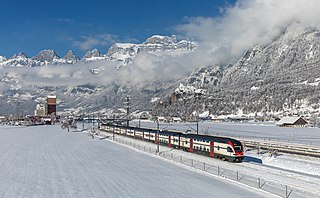
Rapperswil-Jona is a municipality in the Wahlkreis (constituency) of See-Gaster in the canton of St. Gallen in Switzerland. Besides Rapperswil and Jona, which were separate municipalities until 2006, Rapperswil-Jona also includes Bollingen, Busskirch, Curtiberg, Kempraten-Lenggis, Wagen, and Wurmsbach.

The canton of St. Gallen or St Gall is a canton of Switzerland. The capital is St. Gallen.

St. Gallen is a Swiss city and the capital of the canton of St. Gallen. It evolved from the hermitage of Saint Gall, founded in the 7th century. Today, it is a large urban agglomeration and represents the center of eastern Switzerland. Its economy consists mainly of the service sector. The city is home to the University of St. Gallen, one of the best business schools in Europe.

The Walensee, also known as Lake Walen or Lake Walenstadt from Walenstadt, is one of the larger lakes in Switzerland, with about two thirds of its area in the Canton of St. Gallen and about one third in the Canton of Glarus. Other towns and villages at the lake include Weesen, Quinten, Quarten, and Murg.

The following are the 75 municipalities of the canton of St. Gallen,.
The University of St. Gallen (HSG) is an elite research university located in St. Gallen, Switzerland, that specialises in business administration, economics, law, and international affairs. Established in 1898, it consistently ranks among the best business schools in the world and counts as the top one in the German-speaking world. In 2020, it had 9,047 students, of which 3,443 were master's students and 617 were doctoral students.

The counts of Toggenburg ruled the Toggenburg region of today's canton of St. Gallen, Switzerland, and adjacent areas during the 13th to 15th centuries.

Fussballclub St. Gallen 1879, commonly known as St. Gallen, is a Swiss professional football club based in the city of St. Gallen, Canton of St. Gallen. As of the 2022–23 season, the team competes in the Swiss Super League.

Klausen Pass is a high mountain pass in the Swiss Alps connecting Altdorf in the canton of Uri with Linthal in the canton of Glarus. Somewhat unusually, the boundary between the two cantons does not lie at the summit of the pass, but some 8 kilometres (5.0 mi) down the slope towards Linthal, with the summit being in Uri.

St. Margaret's Chapel is a pilgrimage chapel at St. Margarethen in the municipality of Münchwilen in the Canton of Thurgau in Switzerland.
Amden is a municipality in the Wahlkreis (constituency) of See-Gaster, in the canton of St. Gallen in Switzerland.

St. Gallenkappel is a former municipality in the Wahlkreis (constituency) of See-Gaster in the canton of St. Gallen in Switzerland. On 1 January 2013 the former municipalities of Goldingen and St. Gallenkappel merged into the municipality of Eschenbach.

Rapperswil is a former municipality and since January 2007 part of the municipality of Rapperswil-Jona in the Wahlkreis (constituency) of See-Gaster in the canton of St. Gallen in Switzerland, located between Obersee and the main part of Lake Zurich.

Ziegelbrücke is a village situated on both sides of the Linth Channel in Switzerland. Ziegelbrücke is shared by the municipalities of Niederurnen in the canton of Glarus and Schänis in the canton of St. Gallen, with the Linth forming the boundary between these municipalities.

Glarus Nord is one of three municipalities of the canton of Glarus, Switzerland.

Ziegelbrücke railway station is a junction station in the village of Ziegelbrücke in Switzerland. Whilst the village is shared between the municipality of Glarus Nord, in the canton of Glarus, and the municipality of Schänis, in the canton of St. Gallen, the station is located in the Gemarkung of Schänis, where it is the larger of two railway stations.

The Leistchamm is a mountain of the Appenzell Alps, located east of Amden in the canton of St. Gallen. It lies at the western end of the range overlooking the Walensee, named Churfirsten.

The Ziegelbrücke–Sargans railway line is a railway line operated by the Swiss Federal Railways (SBB).

The Chapel of Saint Benedict is a Roman Catholic church located in Sumvitg, Surselva Region, canton of Graubünden, Switzerland.
Ernst Johann Hausamann was a Swiss photographer, businessman, and freemason who later became an intelligence officer. Hausamann's father was a photographer, and when Hausamann grew up he became an amateur photographer himself. He joined the Swiss Militia during World War I and this established his political character. He was initially opposed to left-wing politics and supported a strong military. After the war, he opened a specialist photography business and published an associated magazine, that eventually led the company to work for the Swiss press. During the early 1930's, he worked in the militia's education film service, where he created films that promoted a strong military. With the approach of Nazism, Hausamann was initially sympathetic to the Third Reich but realised the danger to Swiss sovereignty and began to resist. In 1935, he began offering his press service to the Swiss Militia with a focus on military intelligence. In 1936, the General staff sent Hausamann for military training at the Prussian Staff College in Berlin. In 1939, he became the defence policy advisor to the Social Democratic Party of Switzerland. In the lead up to the war, he recognised that the militia lacked a competent military intelligence agency and this led to the founding the Büro Ha, an intelligence agency that was established in September 1939, disguised as a press cuttings agency.


















